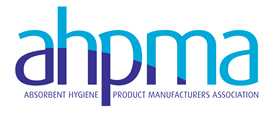Environment
Good environmental stewardship is a key priority for AHPMA members, and industry continues to improve the overall environmental profile of its products along with enhanced performance. Sustainability is also a core responsibility, ensuring that industry makes a positive contribution to the economy, society, and that environmental impacts are constantly monitored and minimised.
The majority of used absorbent hygiene products are managed via the municipal and household waste stream; the remainder are collected commercially from institutions such as hospitals or business premises. The products are compatible with all prevalent forms of waste management but the process by which they are treated will depend on the systems that are in place from one region to another (e.g. landfill, incineration, etc.) In recent years, technologies which reprocess absorbent hygiene products have started to emerge but are not yet operating on a significant scale. The industry monitors all waste technology innovation and ensures that its products are compatible with any mainstream process.
AHPMA also has an open dialogue with external stakeholders such as water groups, consumer groups, NGOs and government departments, to support the drive towards ever more sustainable manufacturing practices, products and consumer behaviour.
Absorbent hygiene products should be disposed of in a bin with general household waste or within an appropriate disposal unit and should never be flushed down the toilet. Manufacturers promote the responsible disposal of absorbent hygiene products and consumers are encouraged to take note of the disposal instructions on product packaging. AHPMA members support the use of a ‘Do not flush’ symbol on all packaging.

Green or environmental claims can sometimes be misleading to consumers. The Department for the Environment, Food and Rural Affairs (DEFRA) has produced guidance for businesses on making ethical claims. Click here to view it.
